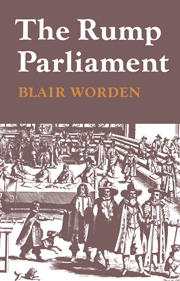Book contents
- Frontmatter
- Contents
- Dedication
- Acknowledgements
- Author's Note
- List of abbreviations
- Introduction
- PART ONE THE RUMP AND THE RUMPERS
- 1 Membership, attendance and allegiance
- 2 The limits of revolution
- 3 Moderation and conformity
- 4 Soldiers and clergymen
- 5 Commitment and corruption
- PART TWO THE RUMP AND REFORM
- PART THREE THE STRUGGLE FOR SURVIVAL, FEBRUARY 1649–SEPTEMBER 1651
- PART FOUR PARLIAMENT versus THE ARMY, SEPTEMBER 1651–APRIL 1653
- PART FIVE THE DISSOLUTION OF THE RUMP
- APPENDICES
- Bibliographical Guide
- Index
5 - Commitment and corruption
Published online by Cambridge University Press: 29 January 2010
- Frontmatter
- Contents
- Dedication
- Acknowledgements
- Author's Note
- List of abbreviations
- Introduction
- PART ONE THE RUMP AND THE RUMPERS
- 1 Membership, attendance and allegiance
- 2 The limits of revolution
- 3 Moderation and conformity
- 4 Soldiers and clergymen
- 5 Commitment and corruption
- PART TWO THE RUMP AND REFORM
- PART THREE THE STRUGGLE FOR SURVIVAL, FEBRUARY 1649–SEPTEMBER 1651
- PART FOUR PARLIAMENT versus THE ARMY, SEPTEMBER 1651–APRIL 1653
- PART FIVE THE DISSOLUTION OF THE RUMP
- APPENDICES
- Bibliographical Guide
- Index
Summary
The nature of the surviving evidence, which tells us much more about the views of individual rumpers after the Rump's dissolution than before it, tempts us to misunderstand the attitude of its members towards the parliament at the time of its sitting. The dissolution, driving large numbers of M.P.s from power for six years, profoundly changed the political attitudes of many of them. Around Cromwell's usurpation of power a mythology developed, leading to retrospective glorification of the Rump's achievements which disguised the limits of its members' earlier enthusiasm for their government. Such glorification repays close inspection. It came sometimes from men lik-Edmund Ludlow, who had in fact turned a blind eye to the dissolution of the Rump until Cromwell's assumption of the title of Protector in December 1653. In the later 1650s rumpers became especially proud of the military, naval and diplomatic accomplishments of their rule, but often their protestations of enthusiasm for the Rump either referred to the Long Parliament as a whole rather than merely to its tail, or were closely associated with resentment at Cromwell's usurpation of power and at military intervention at the time of the dissolution. When less concerned'to vent their bitterness at the events of April 1653, rumpers could be more modest about their glorious past. Heselrige at one such moment made clear the improvised, defensive nature of the republican settlement which had followed Charles's death.
Information
- Type
- Chapter
- Information
- The Rump Parliament 1648–53 , pp. 86 - 102Publisher: Cambridge University PressPrint publication year: 1974
